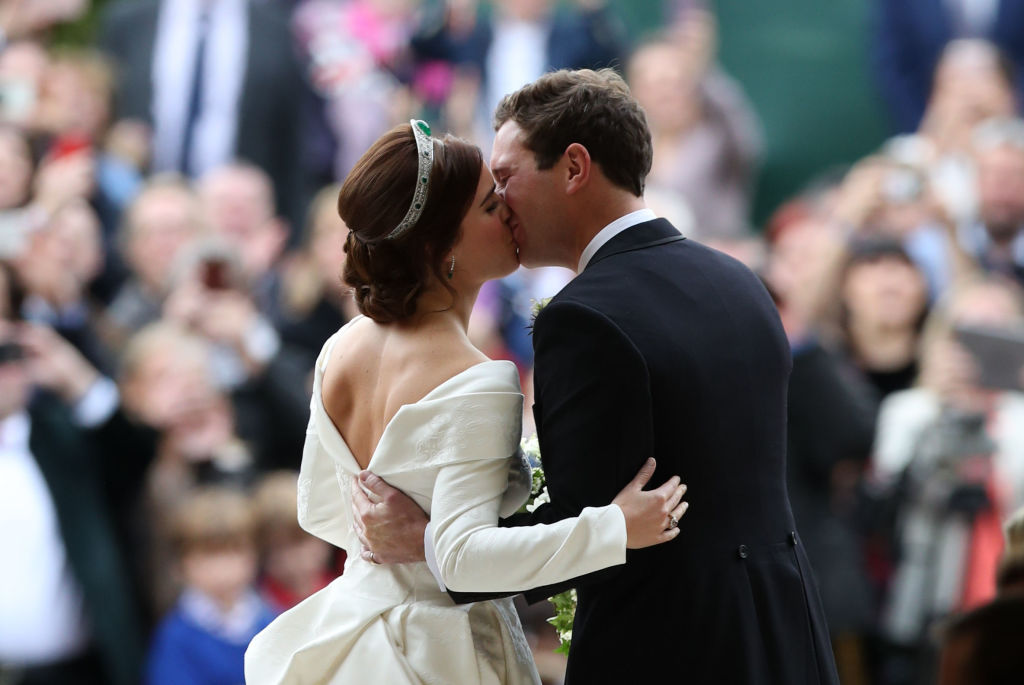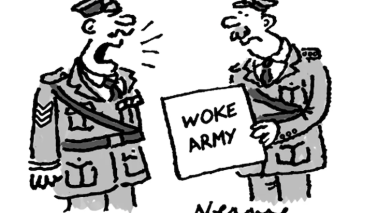In the final volume of his collected letters, Patrick Leigh Fermor recalls watching the wedding of Princess Anne in 1973 in Diana Cooper’s bedroom because she had a colour telly. “She was in an enormous bed, so we all lay on it side by side drinking champagne, watching the procession and the service. It was all very obsolete and indescribably moving; it is one of the few things – pageantry – that the English are better at than anyone (the only thing, it seems, at this moment!) A lovely morning.”
Well, he could have done and said just the same today watching the wedding of Princess Eugenie to Jack Brooksbank, a former nightclub manager. Most of my office was riveted to the screens for the beginning, at least, of the happy event. I even heard someone observe: “everyone loves a wedding”. Even the agnostics liked the hymns.
My own thoughts were as follows: What, no veil? Not sure about the amount of back on display with the dress: was that a statement about her back operation? Doesn’t she look happy? Doesn’t he look nervous? Look at Andrea Bocelli’s black spectacles, poor man. What’s the Duchess of Cornwall doing right now, and, doesn’t the CofE do this sort of thing well? Lovely liturgy. Isn’t it a mercy that no one now remembers the toe sucking episode involving American John Bryant and the bride’s mother? A reading from the Great Gatsby? Really? And will Amal Clooney find it in her to join in the hymns, as she conspicuously didn’t for the wedding of Meghan and Harry?
On mature reflection, I tore myself away from watching the guests – the English upper middle classes scrub up so well on these occasions – and the sheer loveliness of St George’s Chapel (where, don’t you know, the body of saintly Henry VI is interred), to brood on the wider significance of the event.
There are obviously zero constitutional implications; Eugenie is, as people have been at pains to point out, just ninth in line to the throne. But the social aspects are interesting, though it’s interesting to think that once royalty could confer the lustre of respectability on celebs; now it’s the likes of George and Amal that do it for Eugenie and Jack.
But importantly, insofar as the minor royals have a function, it’s in terms of that killer term, as influencers. That is to say, they’re sufficiently watched and followed for their actions to have a knock on effect on a few people from their own generation. And this is, as The Spectator has made abundantly clear – not least in an incisive analysis by Ed West last year – the generation that isn’t getting married. At least, not the people who should be getting married, viz, those who need stability and order in their lives most for their children’s sake – people from the struggling socio-economic end of the spectrum. The way in which marriage has become the preserve of the monied classes should terrify us; I bet it has a bearing on the mental health of children. Maybe, just maybe, Eugenie’s nuptials will give some people of her age (28) the idea that it’s a reasonable thing to do.
But if marriage is in decline, the number of couples getting married in church is even more on a trajectory going the wrong way; one in three couples do so. And although a marriage is primarily conducted between the couple, the blessing of the union in church gives it grace and a social and religious sanction that has to help bind the thing together. Not, admittedly, that the grace worked terribly well in the case of three of the Queen’s four children, including the bride’s father. But even so, it cheers me up when I see a proper church wedding involving normal, not rich, people.
If Eugenie’s marriage was unexpectedly heartwarming, I was even more heartened last Saturday when I passed the swanky Carmelite church in Kensington to find a crowd of people emerging who were dressed to the nines, clutching brollies, and plainly from the opposite end of the spectrum to Mr Jack Brooksbank and the Princess, celebrating the nuptials of one of their own. But on their marriage, just as much as this one, the future of society depends.







Comments